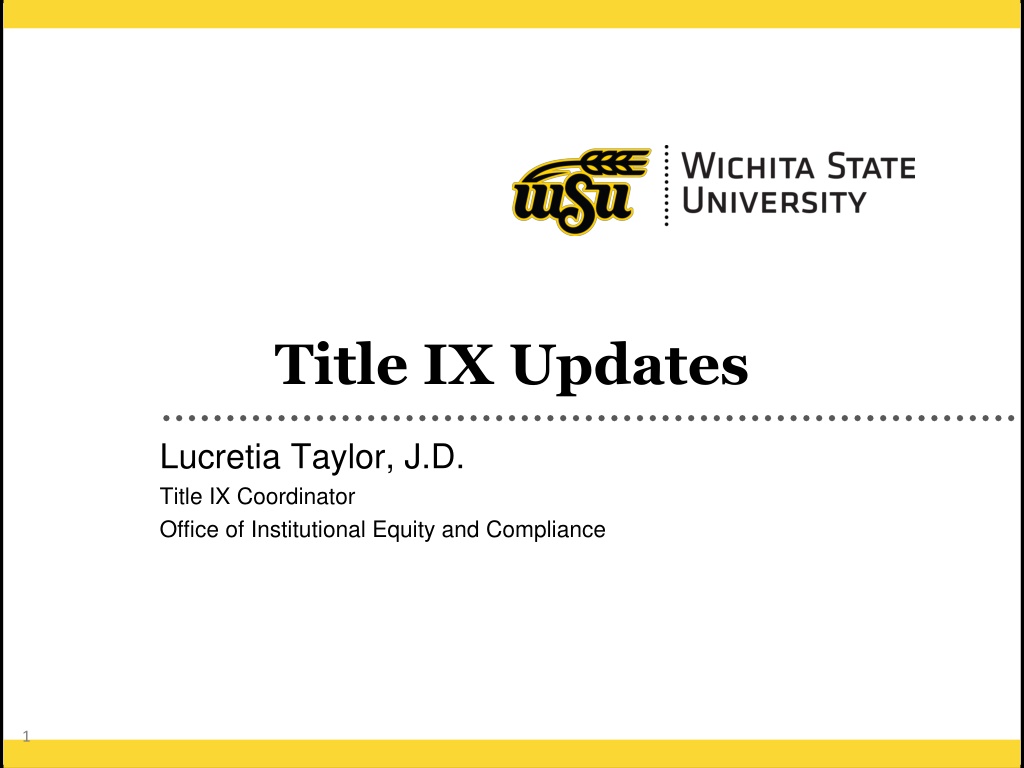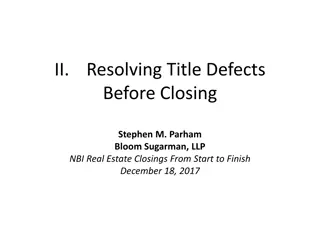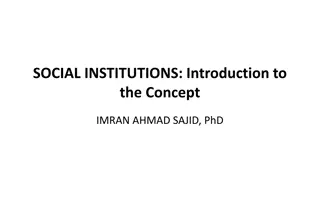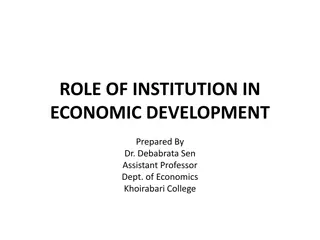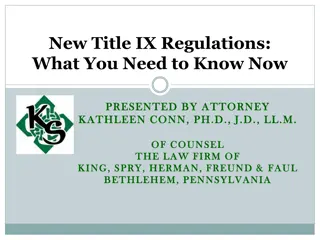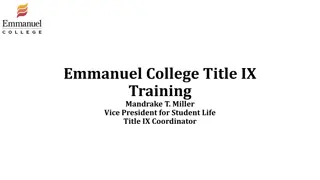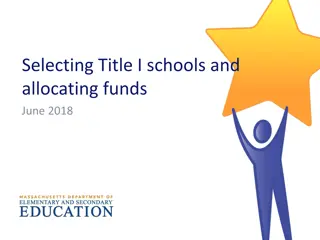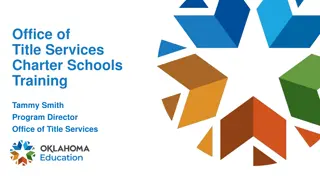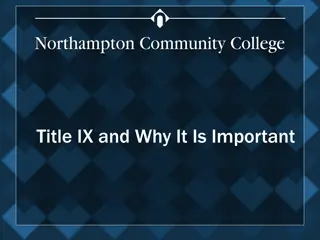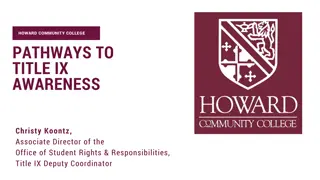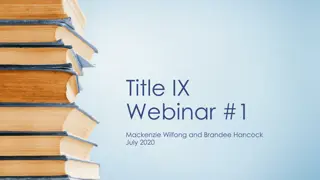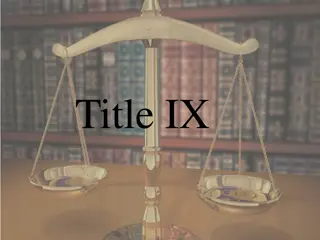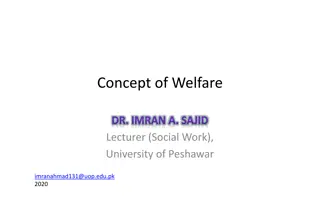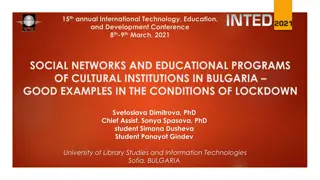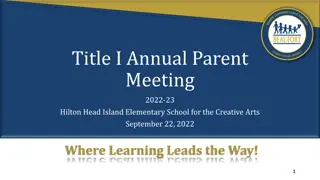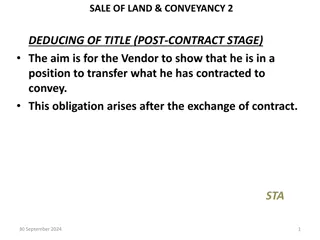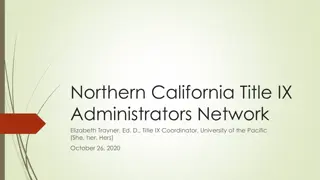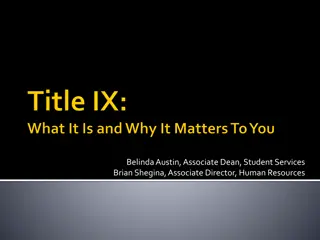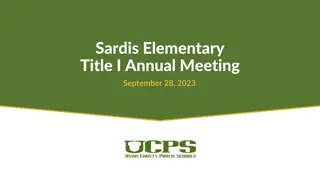Understanding Title IX in Educational Institutions
Title IX of the Higher Education Act of 1972 prohibits sex discrimination in educational institutions receiving federal funding. It ensures equal access and opportunities for all, covering areas from admissions to athletics and addressing issues like sexual violence and harassment. Compliance with Title IX is vital to fostering a safe and inclusive educational environment.
Uploaded on Sep 16, 2024 | 0 Views
Download Presentation

Please find below an Image/Link to download the presentation.
The content on the website is provided AS IS for your information and personal use only. It may not be sold, licensed, or shared on other websites without obtaining consent from the author. Download presentation by click this link. If you encounter any issues during the download, it is possible that the publisher has removed the file from their server.
E N D
Presentation Transcript
Title IX Updates Lucretia Taylor, J.D. Title IX Coordinator Office of Institutional Equity and Compliance 1
What is Title IX? Title IX of the Higher Education Act of 1972 is the civil rights law that bars sex discrimination (including pregnancy, sexual orientation and gender identity) by educational institutions that receive federal funding.
Title IX of the Higher Education Act of 1972 No person in the United States shall, on the basis of sex, be excluded from the participation, be denied the benefits of or be subjected to discrimination under any education program or activity receiving Federal financial assistance. Title IX of the Education Amendments of 1972 Implementing Regulations @ 20 U.S.C. 1681 & 34 C.F.R. Part 106. 3
Scope of Title IX Title IX applies to schools, local and state and other institutions that receive federal financial assistance including: Local school districts Postsecondary institutions Charter schools For Profit schools Libraries and Museums 4
Language Interpretation Initially . . . 1. Male and female students must have equal access to admissions, resources, financial assistance. 2. Gender equity in faculty hiring practices, promotions and salary differentials. 3. College athletics (equity) 5
Language Interpretation A broader interpretation emerged as time went on . . . 4. Sexual violence and harassment The U.S. Supreme Court has established that sexual harassment qualifies as discrimination in violation of Title IX Schools must take steps to prevent sexual misconduct on their campuses 5. Education for pregnant and parenting students 6
Institutional Requirements Title IX requires all institutions to regularly and consistently notify the public, applicants, employees, students, its nondiscrimination policy on the basis of sex in the programs and activities they operate (WSU Policy 3.06).
Title IX Coordinator Title IX requires the designation of a Title IX Coordinator. This individual has the primary responsibility for coordinating a University s efforts related to intake, investigation, resolution and implementation of measures to stop, remediate, and prevent discrimination, harassment and retaliation.
Grievance Process One of the important aspects of Title IX is the requirement of a Grievance process to promptly and equitably resolve complaints alleging discrimination on the basis of sex.
Sex Discrimination Under Title IX Sexual Harassment Sexual Harassment is defined as unwelcome sexual advances, requests for sexual favors, and other physical or verbal conduct of a sexual nature.
Elements of Sexual Harassment Unwelcome Conduct 1. determined by a reasonable person 2. behavior so severe, and 3. pervasive, and, 4. objectively offensive, 5. that it effectively denies a person equal access to a University s education or activity.
Elements of Sexual Harassment Quid Pro Quo 1. an employee of the institution, 2. conditions either implicitly or explicitly the provision of an aid, benefit, or service of the institution, 3. on an individual s participation in unwelcome conduct.
Sexual Assault Sexual Assault means one of the following offenses, whether forcible or non forcible when directed at a person without the person s consent, including instances where the person is incapacitated: Rape Fondling Incest Statutory Rape
Dating and Domestic Violence Dating Violence is defined as violence committed by a person who is or has been in a social relationship of a romantic or intimate nature. Domestic Violence is defined as a fcrime of violence committed by a current or former spouse or intimate partner.
Stalking Stalking is defined as engaging in a course of conduct directed at a specific person that would cause a reasonable person to: fear for their safety or the safety of others, or suffer substantial emotional distress
Propose New Title IX Regulations June 23, 2022, the Office of Civil Rights published the Notice of Proposed Rule Making (NPRM) outlining proposed changes to Title IX regulations. On July 12, 2022, the NPRM was published in the Federal Register and the 60-day comment period began. Review and comment period ends on September 12, 2022.
What are the proposed changes? Clarifying that Title IX s protections against discrimination based on sex apply to sexual orientation, gender identity, and sex characteristics. Replacing the 2020 standard of sex-based harassment ( severe, pervasive, and objectively offensive ) with the broader Title VII standard ( severe or pervasive ).
What are the proposed changes? Requiring institutions to address conduct that occurs off-campus when the respondent is a representative of the institution or otherwise engaged in conduct under the institution s control (providing coverage for study-abroad programs, for example). Making the live hearing and cross-examination requirement optional. Requiring institutions to provide supportive measures to students and employees affected by any type of sex discrimination, including but not limited to sexual harassment.
What are the proposed changes? Expanding the rights of parents and guardians to act on behalf of a student, including seeking assistance under Title IX and participating in a grievance procedure. Expanding the rights of students and employees who are pregnant or have pregnancy-related conditions.
Timeline for proposed changes The final rule is expected to be issued in Spring 2023, with the effective date approximately Summer/Fall 2023. There will be a separate rulemaking process to address Title IX s application to athletics. Universities must continue to fulfill obligations under the current regulations for the 2022-2023 academic year. Schools should expect to implement new Title IX regulations before the start of the 2023-2024 academic year.
Title IX at WSU 22
Policy 3.06/Sexual Harassment, Discrimination and Retaliation for Employees, Students and Visitors The University s Title IX Policy Prohibits all forms of discrimination on the basis of sex. Forms of discrimination on the basis of sex covered by 3.06 Sexual Harassment Quid Pro Quo Sexual Assault Dating Violence Domestic Violence Stalking 23
What Happens When OIEC Receives a Report? Contact the individual impacted OIEC responds to every report Offer appropriate supportive measures (interim measures) Inform of their options and explain process for filing a Formal Complaint Invite the individual impacted to meet with us 25
Supportive Measures Referral to counseling, medical, and/or other healthcare services Referral to the Employee Assistance Program Visa and immigration assistance Student financial aid counseling Referral to community-based service providers Altering campus housing assignment(s) Altering work arrangements for employees or student-employees Safety planning Providing campus safety escorts No contact orders between the parties Academic support, extensions of deadlines, or other course/program-related adjustments Trespass Timely warnings Class schedule modifications, withdrawals, or leaves of absence Increased security and monitoring of certain areas of the campus Any other actions deemed appropriate by the Title IX Coordinator 26
Right to an Advisor The parties may each have an Advisor of their choice present with them for all meetings and interviews within the resolution process, if they so choose. The parties may select whomever they wish to serve as their Advisor. This could include an attorney, advocate or support person. The Advisor cannot have institutionally conflicting roles, for example, the Title IX Coordinator who has an active role in the matter, or a supervisor who must monitor and implement sanctions. A party cannot insist on an Advisor who doesn t have the inclination, time or availability. 27
Grievance Process Six Parts Reporting of prohibited conduct University s response to the report Filing of a Formal Complaint Investigative Process Use of one of the Resolution Processes Informal Resolution Hearing Appeal Process 28
WSUs Formal Grievance Process Hearing or Informal Resolution Investigative Process evidence collected University s Response Report of Prohibited Conduct Formal Complaint Appeal Triggers University Response Both parties may appeal decision Evidence obtained and Witness statements NOTICE to Parties Party & witness interviews (right to an advisor) Evidence collection Outreach Supportive Measures Options Facilitated negotiation or Live hearing (Zoom option) Summary of relevant evidence 29
